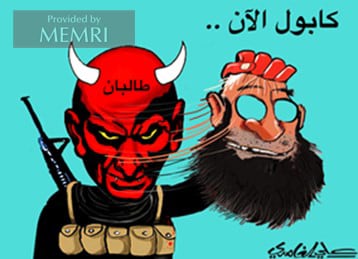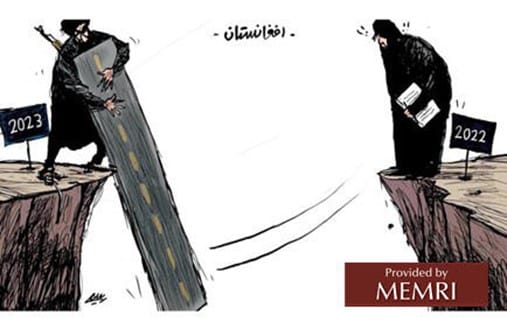A number of articles recently published in the Saudi press criticize the extremist model promoted by the Taliban in Afghanistan and by ISIS and the movements of political Islam. This model, they argue, does not reflect the true spirit of Islam and is based on a misguided implementation of the Islamic shari'a. It results from decades of indoctrination that promoted Islamic jurisprudence suited to past eras, before the age of progress and prosperity in the Muslim world. The articles add that the extremism of these movements reflects an "ideological crisis" in Islam, and that there is therefore an urgent need to enact reforms in order adapt the Islamic shari'a to the modern age and foster a spirit of tolerance and love of life.

Cartoon in Saudi daily captioned "Kabul Today": The Taliban pulls off its mask to reveal its true demonic face (Al-Madina, Saudi Arabia, August 18, 2021)
The following are translated excerpts from these articles.
Saudi Journalist: The Taliban's Islamic State Model Only Oppresses Women And Produces Jihad Fighters
In a sarcastic article in the daily 'Okaz, columnist 'Abdallah Bin Bakhit writes that ISIS, the Taliban and the organizations of political Islam espouse a misguided model of the Islamic state that, instead of promoting progress, only oppresses women and produces jihad fighters. This model, he adds, is the result of the extremist ideas that have been promoted by preachers in the Muslim world for decades. This, he says, is why Al-Azhar, the supreme religious authority in the Sunni Muslim world, refrained from accusing ISIS of heresy. If it did, it would have been forced to direct the same accusation at many other movements and preachers.
Bin Bakhit wrote: "I was glad when Al-Azhar refused to accuse ISIS of heresy. Many intellectuals protested and condemned this [decision], and some even accused this venerable religious university of hatching conspiracies. [But] if we consider the issue in depth, we will see that Al-Azhar took the right decision. It did not find anything in the conduct of ISIS that justified accusing it of heresy. All the decisions taken [by ISIS] and all their actions on the ground conform to the religious rulings we have constantly been hearing about for 40 years. Al-Azhar refrained from accusing ISIS of heresy because this would have meant directing the same accusation at all those who took to the pulpits to preach Islam in the era of the Islamic Awakening that spread through the Arab countries [in the late 20th century].[1] ISIS realized the vision of the [Islamic Awakening] movement in practice and to the letter. They implemented everything they learned from the books of tradition and everything they heard from the senior clerics. Their problem was that they implemented it too soon. They announced [their state] before they had the necessary strength, and the world pounced on them and defeated them. Nobody wants to remain on the losing side, [so] our honorable clerics distanced themselves from [ISIS], although before this they used to provide [ISIS] with funds and fighters and pray for it with all their hearts.
"I was not among those who yearned for the complete disappearance of ISIS. I wanted the world to provide it with territory to establish a state that would implement the shari'a, [the kind of state] that all the organizations of political Islam have promised [to establish] and which all the Muslim peoples have been yearning for. Whenever one of our honorable preachers is asked why the Muslim states are not leading the world, he ascribes this to the fact that we are not implementing the true Islam. Thankfully, the world continues to turn and the dream is now about to come true, because, after the world deprived ISIS of the honor of implementing the shari'a, history gave us the Taliban to perform this duty… Let's wait and see how they implement the shari'a and how this affects the development, prosperity and welfare of the Afghan people and guides the entire world to the right path.
"The Taliban has [already] uprooted women from the universities. This is the first glimmer of the Afghans' success. Women have no place in the university and in the job market. Keeping them at home will officially transform them into [perfect mothers] to raise the coming generations. A woman does not need to study at all, because she has nobler and more important roles, chief of which is to obey her husband, fill his heart with joy, preserve his wealth, keep anyone from entering his home without his permission, including her own parents, and refrain from giving alms without his consent. She must not take a single step outside the home without his permission, and she must dress only according to his taste and wishes. [The home] is her realm, where she sits enthroned, tall and proud, and one of her main roles, for which she was created and which suits her natural inclinations, is to care for [her husband's] children. Her male children will become sources of creativity, production and invention, and constitute the exclusive circle from which jihad fighters and officers in the religious police [are selected]. The world is waiting [to see] the Afghans' successful attempts at producing missiles, planes, computers, semiconductors and everything that leads to progress and [develops] culture, after the plotters deprived ISIS of the opportunity to do so.
"The competition between the American iPhone and the Korean Galaxy is causing us feelings of inferiority. Our people yearn to buy an Islamic mobile phone [manufactured by] the Taliban. I hope to see one on the market very soon. One of the most important characteristics [of this phone] will be compliance with the Islamic shari'a: no camera, no music and no pictures. [Instead of] music, it will offer a selection of Mullah Omar's sermons, lectures by our honorable preachers, Zaghloul Al-Naggar's theories[2] and religious hymns…"[3]
SUPPORT OUR WORK


Cartoon in Saudi daily: The Taliban keeps Afghanistan from progressing (Al-Sharq Al-Awsat, Saudi Arabia, December 23, 2022)
Saudi Journalist: Saudi Arabia Must Lead A Reform To Eliminate Extremist Thinking
In a December 30 article in the daily 'Okaz, journalist Osama Yamani urges Saudi Arabia to promote the development of an Islamic shari'a adapted to the modern age, writing: "The decision of the Taliban government to ban women from studying and from mixing [with men] stems from [the fact that] the extremists in the Taliban government believe and think that they are doing the right thing by following the Islamic shari'a as they learned it from the religious scholars, whom they regard as the authority on the laws of the shari'a and on Islamic jurisprudence. The problem is that the shari'a was created by human beings in a certain period in the past, before the prosperity and progress of the Islamic nation. It is [therefore] suited to the needs and means of that period, based on the knowledge, the economic situation and the general [conditions of] life at the time. This extremist thought [still] prevails because it is rooted in tradition, in erroneous perceptions and in false information that some people have become accustomed to hearing, especially since the transmitters of hadith and the later transmitters strove to erase and conceal [information] about the lives of the first [Muslims] in the time of the [Prophet Muhammad's] mission and [in the time of] the Umayyad and Abbasid caliphate…
"The decision of the Taliban government attests to the existence of an ideological crisis, [and indicates] how much the shari'a needs to be revised and developed and how urgently we need an up-to-date shari'a based on modern principles. All the religious institutions must act to formulate modern shari'a principles, and spread the spirit of tolerance, love of life, hard work, creativity and norms of good living.
"As the sponsor and servant of the holy places [i.e., Mecca and Medina], and [due to its role of] enlightened leadership… the Muslim world looks to Saudi Arabia to lead it towards an updated shari'a and modern principles that match the spirit of the age and comply with common sense, and which will extricate the [Islamic] nation from sectarianism and hatred, unite it [around a shared] ideology, restore its cohesion and bring the hearts [of the believers] together. The Muslim world is in an ideological crisis, which must not be left in the hands of the Islamist forces… This crisis requires us to develop our institutes of learning and pool our efforts to eliminate the benighted way of thinking that has prevailed for centuries, during which poverty, ignorance and sickness spread and enemies took over us." [4]
Senior Saudi Journalist: Only Moderate Islam Will Defeat The Taliban
Senior Saudi journalist 'Abd Al-Rahman Al-Rashed, the former editor of the Saudi daily Al-Sharq Al-Awsat and former director-general of Al-Arabiya TV, likewise contended that only ideological reform can change the Taliban's extremist thinking. He wrote: "The weapon of economic starvation will not avail us in the fight against the Taliban. [Even] the weapons of the marines or nuclear weapons will not deter it. The Taliban is an extremist religious and social movement, and the weapon that can most effectively change it is education and the spreading of moderate Islam by every means that can reach the eyes and the ears [of the Afghans]…
"[The Taliban] leaders are from the old generation although their army [consists of] young people. They live in isolation from the world and are convinced that they are right and the world is wrong. Most Islamic societies were once closed off, but they developed thanks to a program of education and gradual integration in the modern world. [Conversely], the Taliban remained in a difficult situation due to the wars of the past. Its first leader, Mullah Omar, was heard from but few people ever saw him. There was only one faded photo of him that had been taken in secret, because he believed that photography was forbidden [by the Islamic shari'a] and used to punish anyone taking pictures. Today we see that there are [different] opinions within the Taliban, which attests to internal controversy, [but] so far the extremists seem to be winning. Some of the leaders who lived outside [Afghanistan], for instance in Pakistan and Qatar, and have now come back to Kabul are less radical. This includes the emirate's spokesman, [Muhammad Suhail Shaheen], who did not have a convincing answer when a CNN interviewer [sic][5] asked him why the Afghan women are banned from studying when he allowed his own daughters to study in Doha."[6]
[1] The Islamic Awakening (Al-Sahwa Al-Islamiyya) is a Saudi movement founded in the 1980s, whose ideology combined the religious precepts of Wahhabi Salafism and the socio-political ideology of the Egyptian Muslim Brotherhood.
[2] Zarloul Al-Naggar is an Egyptian preacher known for his extremist views. See e.g., MEMRI reports and clips:
Clip No. 9238 - Jordan-Based Egyptian Islamic Scholar Dr. Zaghloul Al-Naggar: The Punishment For Sodomy Is Death, To Prevent Homosexuality From Spreading; The West Is Imposing Its 'Depraved Values' On The Islamic World – May 12, 2021
Clip No. 8815 - Egyptian Islamic Scholar Zaghloul Al-Naggar To Al-Jazeera TV: Bill Gates And Other 'Human Devils' Seek To Curtail World Population, Exterminate Nonproductive Nations By Spreading Viruses And Killing Old People – April 21, 2021;
Special Dispatch No. 3025 - Internationally Recognized Egyptian Geologist/Cleric Zaghloul Al-Naggar: Our Way of Dealing with the U.S. Military Is By Preaching Islam – We Persuaded 20,000 U.S. Troops to Convert to Islam in the First Days of the Gulf War – June 11, 2010;
Clip No. 2033 - Egyptian Cleric Zaghloul Al-Naggar: The Arab World Is Ruled By the Scum of the Earth and the Garbage of All Nations; Jews Are Devils in Human Form, January 6, 2009.
[3] 'Okaz (Saudi Arabia), December 30, 2022.
[4] 'Okaz (Saudi Arabia), December 30, 2022.
[5] The interview was aired on the British Talk TV channel. See Twitter.com/PiersUncensored, May 10, 2022.
[6] Al-Sharq Al-Awsat (London), December 30, 2022.




